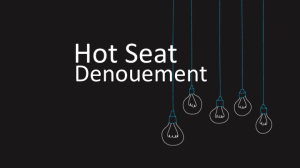Hot Seat Case # 116 Denouement: 12 yo female with an allergic reaction
Posted on: September 14, 2018, by : Haroon Shaukat MD
Sarah Isbey MD, Children’s National Medical Center
Case: 12 yo female with severe seasonal allergies who passed the observation time period in the allergist office after allergy shots but appeared to have an anaphylactic reaction at home. The crux of the dilemma in this case is how to handle cases revolving around AMA (against medical advice).
Here’s How You Answered Our Questions:
Discussion:
Allergic reactions are often not as straight forward as them seem. The literature has consistently proven this with updates in AAAI Guidelines for ED management, but, never any solid evidence pointing in one direction or the other. The first poll question adequately sums that up! No matter your level of training, everyone manages it differently with adjunct medications other than IM Epinephrine.
The dilemma for allowing oral intake in anaphylaxis may not be an issue at all institutions, however, in our algorithm if we suspect anaphylaxis the patient is defaulted to NPO. Dr. Donnelly pointed out the only reason for this type of patient to have an empty stomach is if you anticipate to secure an airway in severe distress. This patient clearly did not come anywhere close to buying an endotracheal tube so allowing her to eat was not an issue. Interestingly, three trainees felt they needed to hold their ground on the NPO situation and probably because they did not realize the true indication for keeping a patient NPO.
The final poll question in reality is much more difficult. We all have been faced with the difficult decision of disposition in a patient that we may not feel as if we are done with. In this situation, it was revolving around the full “observation” time frame in anaphylaxis which again has no solid evidence behind. As we know, the biphasic reaction in anaphylaxis can extend all the way out to 72 hours so this 4-6 hour obs period is completely arbitrary. For some providers, this may make the AMA disposition easier and for others may still make it difficult. The group in real-time was posed with the situation wherein the father is unable to get anyone to come and so your options are either home, security, or admit. This is where experience teased out the risk tolerance. The trainees and junior faculty preferred to admit this child while the senior faculty felt otherwise. A 12 year old with access to 911 was comfort enough to have them go home, while not impinging too much on the fathers job security. Ah the art of medicine at work!
Denouement:
In this case, after multiple discussions with family, the patient was discharged after 3 hours of observation and after eating a full lunch. The physician in charge also spoke to the father’s location of work to explain his slightly late arrival. Her family was able to coordinate a family member to come stay with her. She continued to be symptom free until discharge. She received a home EpiPen as well as EpiPen teaching and school forms, and was instructed to alert her allergy team about the reaction she had. She has not returned to the ED since that time.
The information in these cases has been changed to protect patient identity and confidentiality. The images are only provided for educational purposes and members agree not to download them, share them, or otherwise use them for any other purpose.
